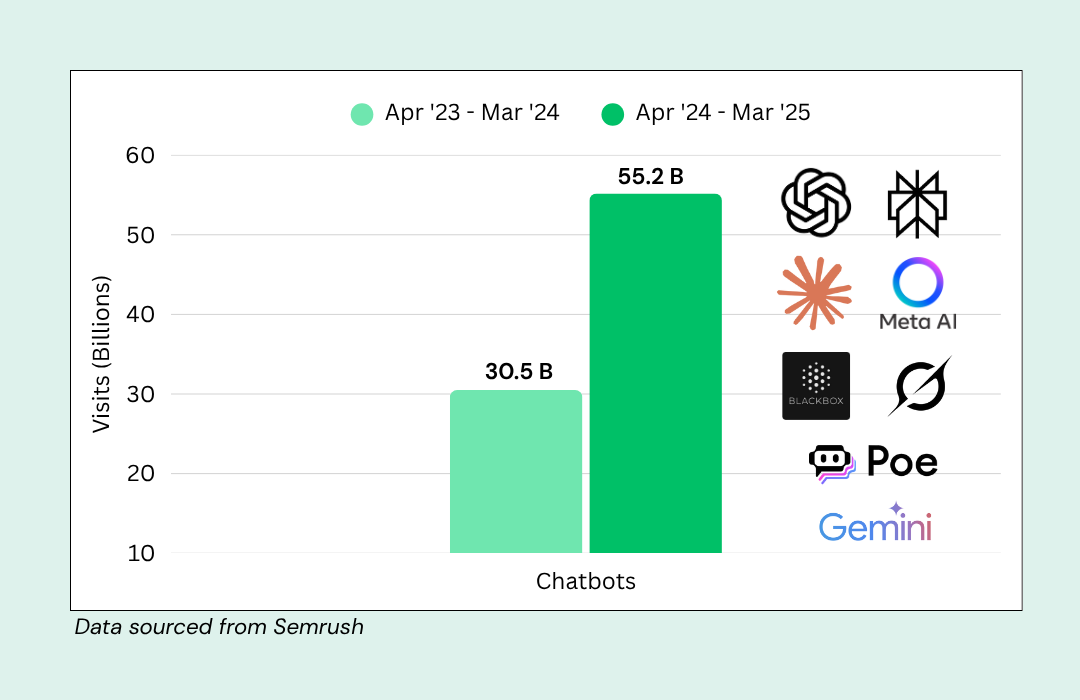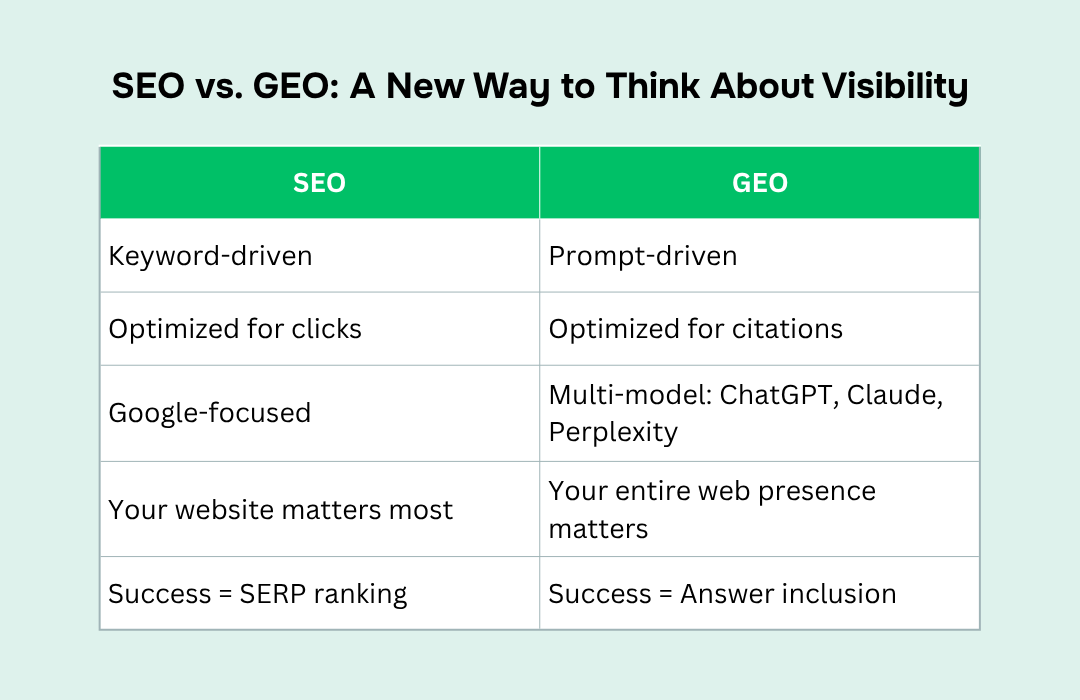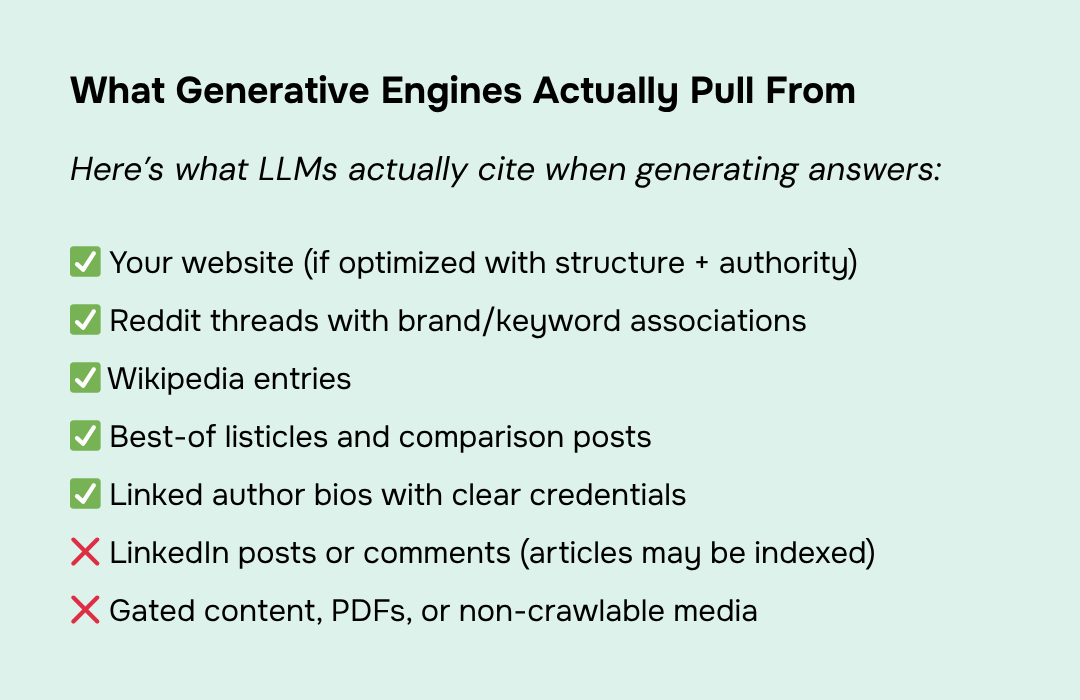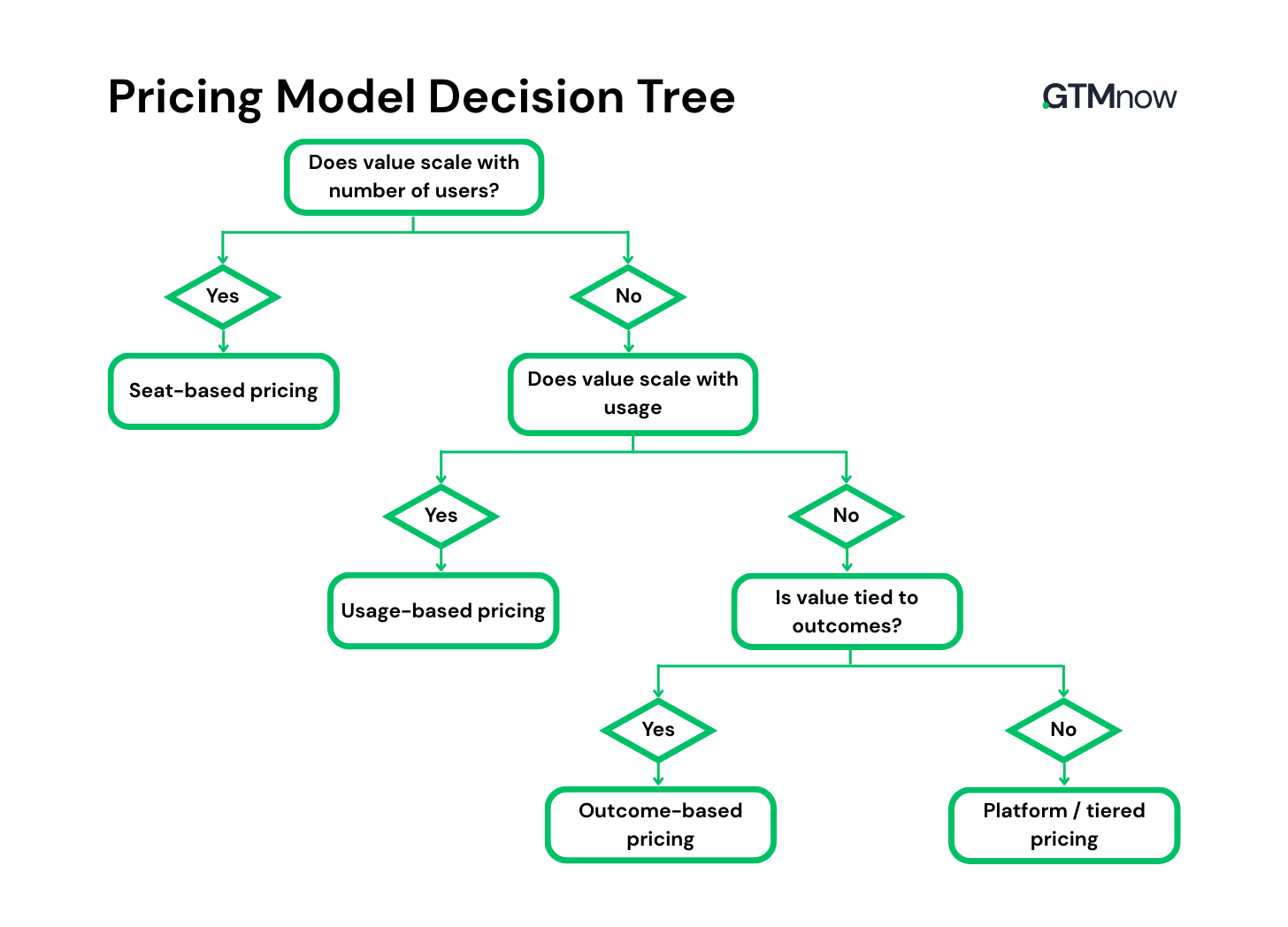How to get cited in ChatGPT+ (and win the new search game)

Hello and welcome to The GTM Newsletter by GTMnow – read by 50,000+ to scale their companies and careers. GTMnow shares insight around the go-to-market strategies responsible for explosive company growth. GTMnow highlights the strategies, along with the stories from the top 1% of GTM executives, VCs, and founders behind these strategies and companies.
Search has changed. It’s no longer just about ranking on page one because there no longer is just “page one.”
Your buyers are asking ChatGPT, Perplexity, Claude, and Gemini what tools to use and who to trust.
And those tools are replying with direct summaries that don’t contain links. If you’re not being cited by the model, you might be missing out on the buyer journey.
It’s like trying to win search traffic in 2008 without indexing your website.
That’s where Generative Engine Optimization (GEO) comes in. This edition covers:
- How GEO works (and how it’s different from SEO).
- How to get cited by ChatGPT and others.
- Advice to make your content more “pickable” by AI.
A special thanks to Hailey Friedman from Growth Marketing Pro, a leading GEO marketing agency, for her contributions. Her work in this space is an absolute goldmine.

Why GEO may matter more than SEO in the next 12 months
AI usage continues to surge. Traffic to AI tools like ChatGPT, Claude, and Perplexity nearly doubled in the last year – from 30.5B to 55.2B visits.

Buyers are turning to AI with serious intent: What tools should I buy? What vendors should I trust?
These tools don’t just serve up 10 blue links, they summarize and serve what they trust.
That means if your content isn’t being pulled into AI answers, you’re invisible.
SEO vs. GEO: A new way to think about visibility
SEO and GEO are not the same game. One is about ranking. The other is about being summarized and cited. If SEO was about being found on Google, GEO is about being trusted by ChatGPT (and other AI engines).

The sources that get you cited in AI results
LLMs pull from a specific set of sources. Use this as a guide.

Your domain authority is now distributed.
4 GEO tactics that will get you cited in AI answers
1. Optimize your core pages for AI prompts
- Use natural-language headlines (your H1s) to match buyer queries: (e.g. what’s the best [category] for [persona]?”
- Include FAQs, bullet takeaways, and long-tail context to increase coverage of conversational prompts and improve scannability for both LLMs and users.
- Include author name, credentials and LinkedIn link to boost credibility.
- Implement schema (Article, FAQ, Person, Organization) to help AI models and search engines interpret your content structure and metadata correctly.
- Add a llms.txt file to your site root (like robots.txt, but for AI) to signal what content LLMs should crawl, index, and associate with your brand.
2. Rank in “best of” listicles and comparison posts
Since LLMs frequently cite these, you could:
- Create your own or contribute to others.
- Pitch niche blogs, software communities, or review publishers.
3. Build authority beyond your website
LLMs don’t just rely on your site, they triangulate your reputation.
- Reddit: High-karma comments mentioning your brand.
- Wikipedia: If eligible, create a page with citations.
- Backlinks: Prioritize high-authority, relevant links over volume.
4. Monitor what the models are saying
- Use a generative search monitoring tool to track prompts like: “Best [category] tools” or “[you] vs [competitor].”
- Compare how different models (ChatGPT, Claude, Perplexity) cite you.
- Spot gaps and optimize accordingly.
How to track GEO ROI (yes, it’s measurable)
The great news about GEO is that it’s measurable. Here’s how to do so:
- Prompt visibility: Use a gen-AI search monitoring tool to see if you show up in ChatGPT, Claude, Perplexity.
- Traffic sources: Use GA4 or your CRM to track traffic from LLM tools like Perplexity.
- Revenue impact: Monitor leads/deals tied to LLM-sourced visits.
- Prompt-to-lead funnel: How many AI prompts → clicks → conversions.
If you’re short on time, start with a 1-page GEO plan
Another way to think about this is a “Minimum Viable GEO Plan”:
- Pick one high-intent query (e.g. “best AI email tools for sales teams”).
- Optimize a single page: FAQs, author bios, schema, and clear prompt-style header.
- Add a llms.txt file.
- Track prompt visibility in a generative search monitoring tool.
Get listed in one listicle or high-ranking relevant Reddit thread.
Where GEO is headed
We’re in the GEO era and it’s only increasing.
- AI is becoming the homepage. Your homepage may no longer be the first touchpoint – AI summaries are.
- Paid search is being replaced. Google’s AI Overviews are pushing ads and organic results below the fold.
- Content is the new distribution strategy. GEO turns high-quality, structured content into top-of-funnel surface area.
GTM teams need a new skillset. Just like SEO changed marketing in the 2010s, GEO will reshape go-to-market in the 2020s.
GEO doesn’t replace SEO, it builds on it.
If you’re now wondering whether SEO is still worth investing in, the answer is yes. But, it’s no longer enough.
The question isn’t “should we stop doing SEO?” it’s “are we adapting it for the way people discover today?”
The most effective thing you can do is integrate both. Think of it like an extension of SEO.
For more on the future of search/GEO, check out the The GTMnow Podcast bonus episode with the CEO of Yext. It’s a short 21-minute listen on the digital search revolution.
Share on LinkedIn | Share on X
Tag @GTMnow so we can see your takeaways and help amplify them.
👂 More for your eardrums
GTM 155: The Next Digital Revolution: You Optimized for Humans, Now You Have to Optimize for AI
This short episode explores one of the most important shifts happening in go-to-market right now: the move from optimizing for humans to optimizing for AI.
Mike Walrath, CEO of Yext and former founder of Right Media (acquired by Yahoo for $850M), shares why this change is as big (or bigger) than the first wave of digital transformation.
You’ll learn how AI agents are changing how customers discover businesses, why your structured data now matters more than your homepage, and what you can do to stay ahead.
Listen on Apple, Spotify, YouTube, or wherever you get your podcasts by searching “The GTM Podcast.”
🚀 Startup to watch
Iris just launched the first AI analyst that delivers fast, accurate answers to real business questions (without the bottlenecks of SQL, dashboards, or data teams). It’s like having a top-tier analyst embedded in every function: marketing, ops, recruiting, strategy.
LuminX – announced a $5.5M Seed round to bring the power of Vision Language Models (VLMs) to industrial operations. Their technology runs on affordable, portable devices that can be deployed anywhere on the factory floor — enabling teams to “see and understand” their workflows in real time. The goal: automate manual tasks, reduce costly errors, and unlock smarter, more efficient operations at the edge.
👀 More for your eyeballs
ZoomInfo’s new GTM Intelligence Report shows AI adoption has surged 893% since 2022 — but most companies still aren’t seeing real results. Why? Only 19% say their data is AI-ready. Without clean, structured data, the promise of AI falls flat.
Lovable becomes a unicorn with a $200M Series A, just 8 months after launch. Stockholm-based Lovable, an AI startup helping users build websites and apps using natural language, has raised a $200M Series A led by Accel at a $1.8B valuation. Often compared to tools like Cursor, Lovable turns large language models into intuitive no-code builders. In just eight months, the company has skyrocketed to over 2.3 million active users — making it one of Europe’s fastest-growing AI startups.
🔥 Hottest GTM jobs of the week
- Inbound Account Executive at Owner (Remote – North America)
- Digital Customer Success Manager at Closinglock (Austin, TX)
- Business Development Team Lead at Stotles (London, UK)
- Growth – Community, Ecosystem & Events at Pocus (Hybrid – SF / NY)
- AI-Era SEO & Content Discoverability Lead at Atlan (Remote – US)
See more top GTM jobs on the GTMfund Job Board.
If you’re looking to scale your sales and marketing teams with top talent, we couldn’t recommend our partner Pursuit more. We work closely together to be able to provide the top go-to-market talent for companies on a non-retainer basis.
🗓️ GTM industry events
Upcoming go-to-market events you won’t want to miss:
- INBOUND 2025: September 3-5, 2025 (San Francisco, CA)
- Pavilion GTM Summit: September 23-25, 2025 (Washington, DC)
- Dreamforce: October 14-16, 2025 (San Francisco, CA)



